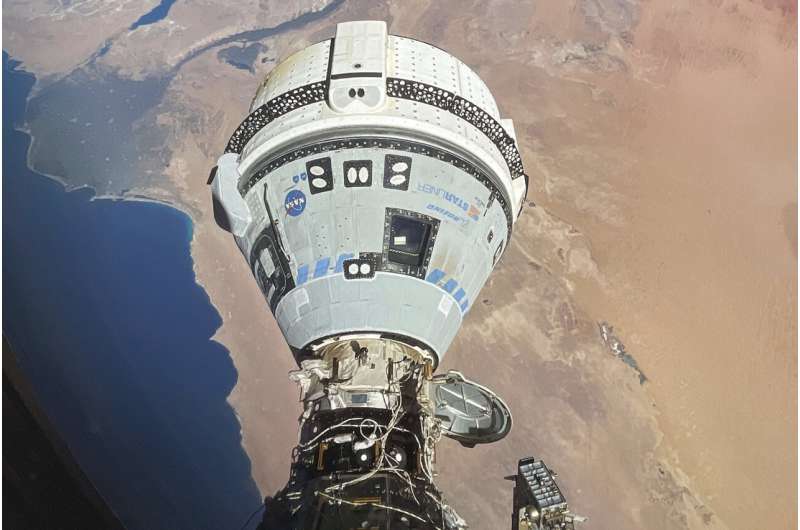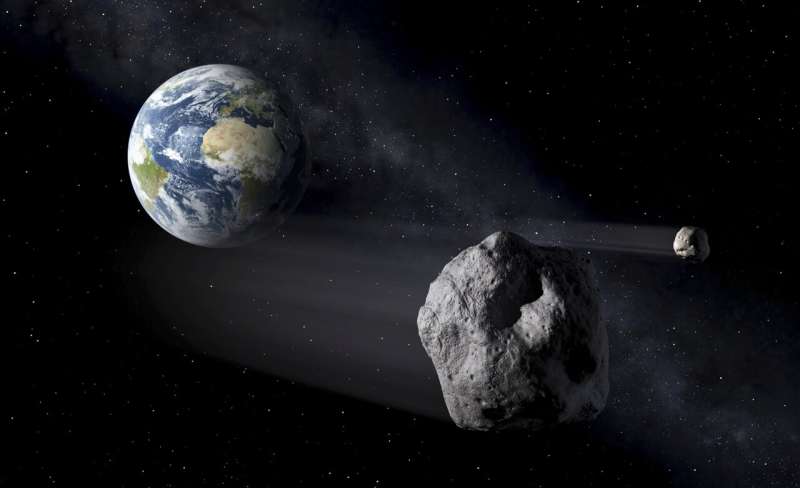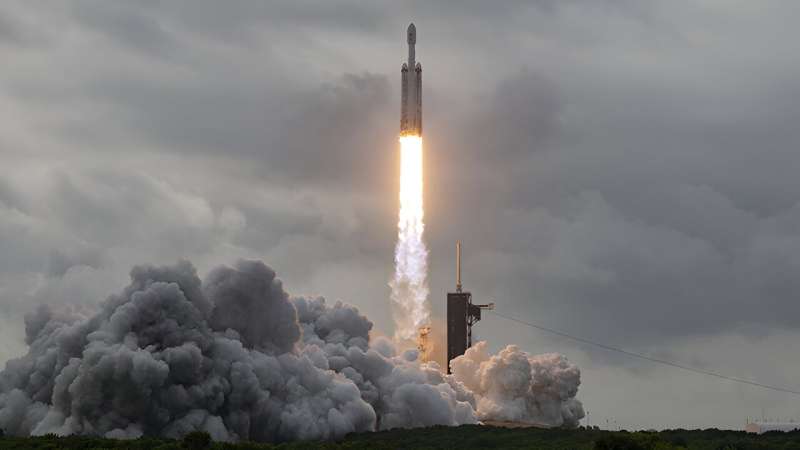Eumetsat moves weather satellite from Ariane 6 to Falcon 9
Saturday, 29 June 2024 15:49

SpaceX launches second batch of satellites for NRO’s proliferated constellation
Saturday, 29 June 2024 08:03

NASA astronauts will stay at the space station longer for more troubleshooting of Boeing capsule
Saturday, 29 June 2024 07:56
Two NASA astronauts will stay longer at the International Space Station as engineers troubleshoot problems on Boeing's new space capsule that cropped up on the trip there.
NASA on Friday did not set a return date until testing on the ground was complete and said the astronauts were safe.
"We're not in any rush to come home," said NASA's commercial crew program manager Steve Stich.
Veteran NASA test pilots Butch Wilmore and Suni Williams blasted off aboard Boeing's Starliner capsule for the orbiting laboratory on June 5.
Prize winner wants to detect asteroids coming from sun’s direction
Friday, 28 June 2024 22:06

NASA insists Boeing Starliner crew 'not stranded' on ISS
Friday, 28 June 2024 20:41 The first astronauts to fly Boeing's troubled Starliner are definitely not "stranded" at the International Space Station, NASA insisted Friday despite having no clear timeframe for bringing them home.
In an unusually defensive press call, officials attempted to put a positive spin on where things currently stood after weeks of negative headlines due to the spaceship's delayed return.
Ast
The first astronauts to fly Boeing's troubled Starliner are definitely not "stranded" at the International Space Station, NASA insisted Friday despite having no clear timeframe for bringing them home.
In an unusually defensive press call, officials attempted to put a positive spin on where things currently stood after weeks of negative headlines due to the spaceship's delayed return.
Ast Meteorites strike Mars far more often than thought, probe finds
Friday, 28 June 2024 20:41 Mars is bombarded with basketball-sized meteorites on a nearly daily basis, fives times more often than previously estimated, seismic recordings from a NASA spacecraft have revealed.
Before the new study was published on Friday, the best guess for how many meteorites strike Mars was made by looking at images taken by orbiting spacecrafts or models based on craters on the Moon.
But NASA's
Mars is bombarded with basketball-sized meteorites on a nearly daily basis, fives times more often than previously estimated, seismic recordings from a NASA spacecraft have revealed.
Before the new study was published on Friday, the best guess for how many meteorites strike Mars was made by looking at images taken by orbiting spacecrafts or models based on craters on the Moon.
But NASA's Precision instrument bolsters efforts to find elusive dark energy
Friday, 28 June 2024 20:41 Dark energy - a mysterious force pushing the universe apart at an ever-increasing rate - was discovered 26 years ago, and ever since, scientists have been searching for a new and exotic particle causing the expansion.
Pushing the boundaries of this search, University of California, Berkeley physicists have now built the most precise experiment yet to look for minor deviations from the acce
Dark energy - a mysterious force pushing the universe apart at an ever-increasing rate - was discovered 26 years ago, and ever since, scientists have been searching for a new and exotic particle causing the expansion.
Pushing the boundaries of this search, University of California, Berkeley physicists have now built the most precise experiment yet to look for minor deviations from the acce NASA-IBM team up for large language models for advanced research
Friday, 28 June 2024 20:41 Collaborations with private, non-federal partners through Space Act Agreements are a key component in the work done by NASA's Interagency Implementation and Advanced Concepts Team (IMPACT). A collaboration with International Business Machines (IBM) has produced INDUS, a comprehensive suite of large language models (LLMs) tailored for the domains of Earth science, biological and physical sciences
Collaborations with private, non-federal partners through Space Act Agreements are a key component in the work done by NASA's Interagency Implementation and Advanced Concepts Team (IMPACT). A collaboration with International Business Machines (IBM) has produced INDUS, a comprehensive suite of large language models (LLMs) tailored for the domains of Earth science, biological and physical sciences Video game designers battle to depict climate impacts
Friday, 28 June 2024 20:41 Game designer Sam Alfred is keenly aware of the challenge he faces in trying to build a video game with climate change at its heart.
Lists of best-selling games are filled with titles pushing destruction and violence rather than constructive engagement with the environment.
Yet "Terra Nil", a strategy game designed by Alfred and released in March last year, puts players in charge of rebu
Game designer Sam Alfred is keenly aware of the challenge he faces in trying to build a video game with climate change at its heart.
Lists of best-selling games are filled with titles pushing destruction and violence rather than constructive engagement with the environment.
Yet "Terra Nil", a strategy game designed by Alfred and released in March last year, puts players in charge of rebu NRL CCOR begins mission on NOAA's GOES-U satellite to track space weather
Friday, 28 June 2024 20:41 The U.S. Naval Research Laboratory's (NRL) Compact Coronagraph (CCOR) launched on June 25 aboard the National Oceanic and Atmospheric Administration's (NOAA) Geostationary Operational Environmental Satellite-U (GOES-U) from NASA's Kennedy Space Center. The CCOR aims to detect and analyze coronal mass ejections (CMEs).
NOAA sponsored the NRL to develop CCOR, a small space telescope that cre
The U.S. Naval Research Laboratory's (NRL) Compact Coronagraph (CCOR) launched on June 25 aboard the National Oceanic and Atmospheric Administration's (NOAA) Geostationary Operational Environmental Satellite-U (GOES-U) from NASA's Kennedy Space Center. The CCOR aims to detect and analyze coronal mass ejections (CMEs).
NOAA sponsored the NRL to develop CCOR, a small space telescope that cre Advanced Tech for Crisis Response Unveiled by AHEAD Project
Friday, 28 June 2024 20:41 In a live demonstration on 25 June 2024, the AHEAD (Autonomous Humanitarian Emergency Aid Devices) project showcased advanced technologies designed for humanitarian aid and disaster management. The German Aerospace Center (DLR) collaborates with partners to develop remote-controlled transportation technologies to support disaster relief, aiming for driverless vehicles to reach areas inaccessible
In a live demonstration on 25 June 2024, the AHEAD (Autonomous Humanitarian Emergency Aid Devices) project showcased advanced technologies designed for humanitarian aid and disaster management. The German Aerospace Center (DLR) collaborates with partners to develop remote-controlled transportation technologies to support disaster relief, aiming for driverless vehicles to reach areas inaccessible Military space trackers to keep public informed on Starlink satellite reentries
Friday, 28 June 2024 20:02

A harmless asteroid will whiz past Earth Saturday. Here's how to spot it
Friday, 28 June 2024 16:03
LLNL gamma-ray sensor has the best resolution
Friday, 28 June 2024 12:10
It's official. An instrument designed and built by Lawrence Livermore National Laboratory (LLNL) researchers is the highest-resolution gamma ray sensor that has ever flown in space.
The Livermore high-purity germanium (HPGe) gamma ray sensor is an essential part of a larger gamma-ray spectrometer (GRS) built in collaboration with researchers from Johns Hopkins Applied Physics Laboratory (JHAPL) in Laurel, Maryland.
The GRS is part of a suite of instruments launched Oct.13 from the Kennedy Space Center aboard a SpaceX Falcon Heavy rocket to make the first-ever visit to Psyche, the largest metal asteroid in the solar system.



